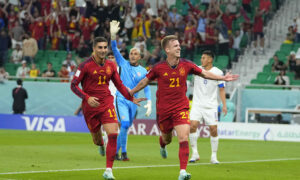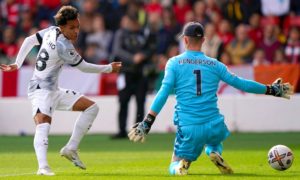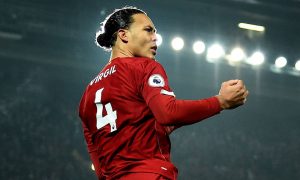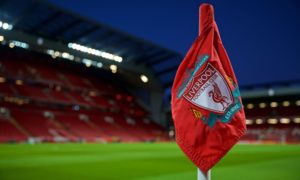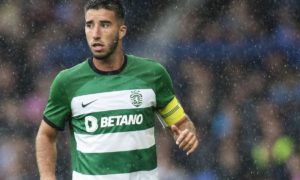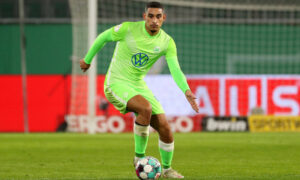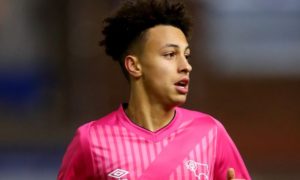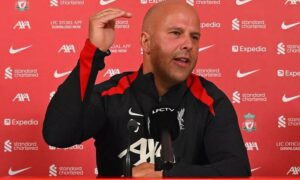Liverpool FC has won a total of 63 major trophies since the club was founded in 1892 – including 19 league titles, 6 European cups, 3 EUFA cups, 4 EUFA super cups, 7 FA cups, 8 league cups, 1 club world cup and 15 community shields. Here we will go through the full list of the trophies that the club has won in chronological order.
1900/01 – League title
Liverpool managed to secure their first title in 1901. Their title charge seemed to be fading in the later stages of the season but once the manager (Tom Watson) got a win against his former team Sunderland in February, the Reds didn’t look back and won 5 league games out of 8 – scoring thirteen and conceding four.
With their last game of the season against an almost relegated West Bromwich Albion, the Reds got the job done and were crowned as champions of England for the first time.
When Everton had moved to Goodison Park some 9 years earlier (as on year 2020), the club’s president at the time (John Holding) found himself with the rights to Anfield but without team to play in it. As a practical man, Holding decided to form his own team and Liverpool Football Club was established.
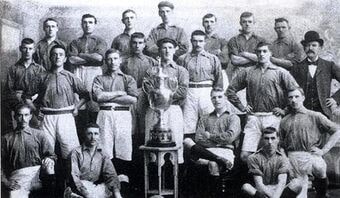
1905/06 – League title
Liverpool’s second title was also won on fine margins, with the Reds finishing the season top of the table with 51 points – just 4 points above Preston in second place and 7 points above Sheffield Wednesday who came third.
1921/22 – League title
Meanwhile, the 1921-22 season was Liverpool’s 30th season of football since the club was established in 1892, and the Reds celebrated their anniversary in style with their third league title whilst Manchester United were relegated to the second division.
1922/23 – League title
Back to back titles occurred for the first time in Liverpool’s history in season that followed – Harry Chambers being Liverpool’s standout man of the campaign with 22 goals in 39 appearances.
However, David Ashworth (who had led Liverpool to their title success the year before) was no longer at Liverpool when they won the league again in 1922 after he controversially returned to Oldham before the end of the season for his second spell as a manager there.
He then left Oldham for a second time in 1924 and lasted less than half a term at Manchester City. Ashford rightly takes his place in Liverpool’s Hall of Fame, but we can only imagine what he might have achieved at the club if he had stayed with the Reds a while longer.
1946/47 – League title
In the aftermath of the second world war, Liverpool managed to secure their fifth league title – winning the league just one point above Manchester United in second place who, Like Liverpool, were starting to create an impressive collection of silverware at the top of English football.
1963/64 – League title, Community Shield
When a man named Bill Shankly first arrived at Anfield in 1959, Liverpool Football Club was fading into the background. Their league title in 1947 was shrouded in a sense of hypocrisy as a team’s success during that time was largely dependent on how well they had come out of the second world war, and a number of poor years which followed had resulted in Liverpool being relegated to the second division in 1954.
Thankfully, the now great Bill Shankly plucked us out of our hole and put Liverpool back in the first division in 1962 with an 8th placed finish in the league. Anfield quickly became a ‘bastion of invincibility’ under Shankly with home defeats coming few and far between as they do so now under Jurgen Klopp, and Liverpool won the league title again in 1964 before winning the community shield for the first time a few months later.
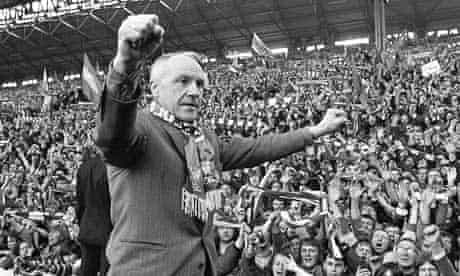
1964/65 – FA Cup, Community Shield
The club had reached its first FA Cup final in 1914 but the lost the game to Burnley, and Liverpool would have to wait another 51 years before they managed to secure a piece of silverware from the competition.
With a crowd of over 100,000, the final was played against Leeds United at Wembley but neither team was able to score within the first 90 minutes. Liverpool defender Gerry Byrne, who broke his collarbone early on in the match but carried on because there were no substitutes, was involved in the opening goal in extra time before Leeds equalized seven minutes later. Liverpool found the winner in the 117th minute though – finishing the game with a 2-1 win.
The Reds also won their second community shield in 1965 (then known as the charity shield) – a competition which is played between the previous season’s first division and FA cup winners. In the past, the trophy would be shared between the two clubs if neither team won the game within the first 90 minutes, and this is exactly what happened after Liverpool drew 2-2 with West Ham United.
1965/66 – League Title, Community Shield
Shankly’s second title came in 1666 with the help of Roger Hunt who was exceptional for Liverpool that season – scoring a total of 29 league goals. Liverpool also shared the community shield again – this time with Manchester United after another 2-2 draw.
Supporters had no idea, but Liverpool were about to embark upon the most exceptional 15-20-year period that the club has ever seen.
1972/73 – League title, UEFA Cup
The 1972/73 season sparked Liverpool’s dominance in both English and European football in the 1970’s and 80s, with the Reds picking up their eighth league title by 3 points above second placed Arsenal and their first European trophy (The EUFA Cup) after beating Borussia Monchengladbach over two legs – making it the highlight of BillShankly’s career. To this day, Liverpool still hold the record for most UEFA Cups won by a team in England (3)
1973/74 – FA Cup, Community Shield
With a packed-out Wembley stadium again, the 93rd FA Cup final hosted Liverpool vs Newcastle United. This one was more straight forward for the Reds in comparison to their win over Leeds, with two goals from Kevin Keegan and one from Stevie Highway making it 3-0 to Liverpool. Another trip to Wembley followed shortly afterwards – this time for the community shield against Leeds United which saw the Reds come out on top.
At the age of 60, Shankly retired from the club at the end of the 1973/74 season but passed on the position to future club legend Bob Paisley who would lead the club through their most successful period to date. It’s difficult to imagine what position the football club would be in if it wasn’t for Shankly’s contribution at Liverpool, but there is no doubting that, as the plaque below his statue at Anfield reads, “he made the people happy” and pushed Liverpool to compete at the top of English football once again.
1975/ 76 – League title, UEFA Cup, Community Shield
Paisley had begrudgingly taken on the role from Shankly after being part of the backroom staff throughout Shankly’s years as head coach – now tasked with out doing the man who had become Liverpool’s most successful and well-respected manager to date.
By the summer of 1976 though, Paisley had begun to build on the foundations that Shankly had laid out for him – winning his first league title and the EUFA cup. The Reds also won the community shield again and, for the first time ever, they did not need to share it this time as they won the game 1-0.
If one thing was for certain when Paisley took over as manager, it was that money was never a driving factor for him at Liverpool. The 55-year-old had already spent almost 15 years at Anfield as a player, assistant trainer, and chief trainer, so his devotion to the club was clear from the beginning.
1976/ 77 – League title, European Cup, Community Shield
Liverpool became European champions for the first time in 1977 after a 3-1 win over Borussia Monchengladbach at the Stadio Olimpico in Rome and the trophy has gained a reputation for returning to Merseyside ever since.
The Reds had already won against Monchengladbach after beating them in the EUFA cup final in 1973, and with goals from Terry McDermott, Tommy Smith and Phil Neal, Bob Paisleys men became the undisputed kings of Europe by the full-time whistle.
The clubs tenth league title also followed on from this alongside another community shield.
1977/78 – European Cup, Super Cup
As the reigning champions, the Reds followed on from this with their second European Cup in 1978 – this time beating Club Brugge 1-0 at Wembley to become the first English team to retain the trophy.
1978/79 – League title, Community Shield
Liverpool’s European campaign was less successful than it had been the previous two years, but Paisley’s team did manage to secure their third league title in the 1978/79 season. The Reds had an injury ridden start to the campaign and Frank McGarvey, their new striker, was unable to make an impact on his debut season. The Reds went on a 16-game unbeaten run after October 16 though which led to title race between them and Manchester United until the end of the season. When United slipped up on their last game of the season against Leeds, Liverpool clinched the title by two points.
Kenny Dalglish scored the winner in the community shield not too long after this, with Liverpool winning game 3-1 against Arsenal.
1979/80 – League title, Community Shield
An early European exit, another league title and one more community shield mirrored the previous season for Liverpool in 1980.
Kenny Dalglish and David Johnson both came good for the Reds – scoring a total of 31 goals in the league between one another.
1980/81 – European Cup, League Cup
The season had been rampant with injuries, but it did not stop Liverpool from storming towards the 1981 Champions League final – winning all but one of their ties in the knockout stages by at least five goals.
As a result, Liverpool were given the chance to win European silverware again as they strode out at Munich’s Olympiastadion with a 2-1 win over Real Madrid.
1981/82 – League title, League Cup, Community Shield
The Reds struggled to rebuild their team in early stages of the 1981/82 season, but a number of youngsters gradually settled down into the first team to win Liverpool their 13th league title. Paisley claimed that this one had been “the hardest to win”, but it did lay down the foundations for what would become Liverpool’s squad throughout the 80’s.
The Reds also won the community shield again in 1982, and another league cup also followed – this one coming after the Reds beat Tottenham Hotspur 3-1 at Wembley.
1982/83 – League Title, League Cup
Liverpool were able to replicate this success again in the following season with another league title and one more league cup. After almost fifty years with the club from varying capacities though, this would be Bob paisleys last season with Liverpool.
His devotion to the football club was unlike anything supporters had ever seen before and Paisley was able to not only win every competition other than the FA Cup with Liverpool, but he also signed some of the clubs greatest ever players including Graeme Souness and Kenny Dalglish. The man who had followed on from a legend had well and truly become one himself.
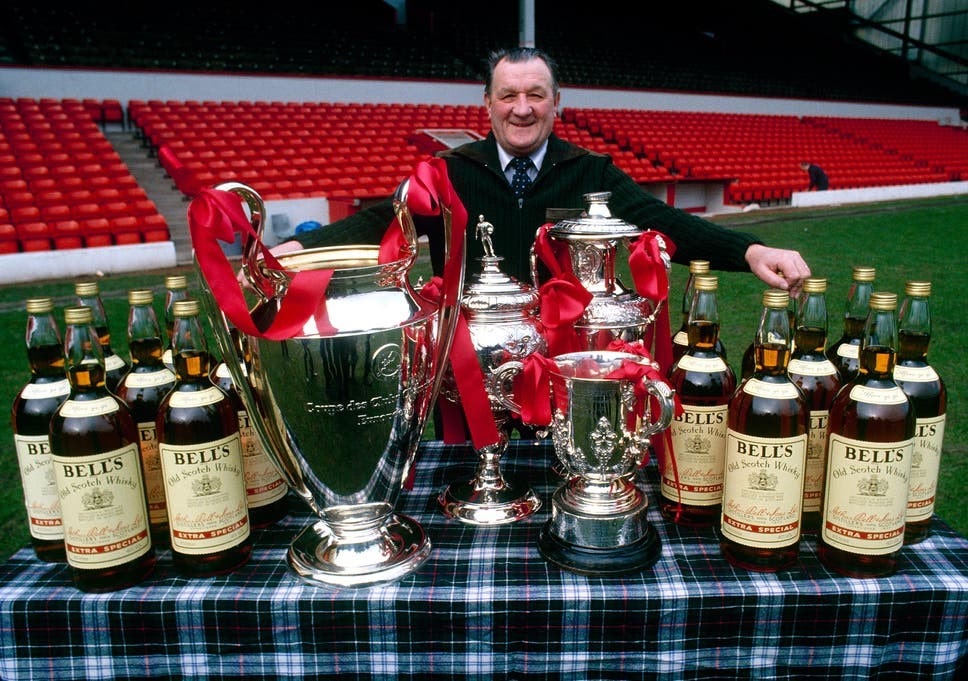
1983/84 – League Title, European Cup, League Cup
Perhaps the most remarkable season in Liverpool’s history, the Reds continued to dominate English football with one league title and another league cup, whilst also securing their fourth European trophy after beating AC Roma in Rome. Bob Paisley’s successor was Joe Fagan – a man whose achievements at Anfield are not recognized as profoundly as Bob Paisley’s or Bill Shankly’s given how short his reign at Liverpool was, but who’s success with the club cannot go understated.
1985/86 – League Title, Super Cup, FA Cup, Community Shield
Two seasons later and Liverpool were back at it again – picking up another four pieces of silverware to add to their collection – now under the leadership of Liverpool legend Kenny Dalglish.
Fagan had left the club after just two seasons with Liverpool after his second campaign with the Reds concluded in the aftermath of the Heysel stadium disaster in which 39 Juventus fans were killed before the start of the 1985 European cup final.
In his autobiography, Dalglish stated that Fagan had been left a “haunted man for the rest of his life” after witnessing the tragic event.
1987/88 – League Title, Community Shield
Kenny’s first title and community shield as a manager for Liverpool came in 1988.
With Ian Rush’s move to Juventus in the summer, John Aldridge became Liverpool’s star striker – grabbing himself a total of 26 goals in the league alongside Peter Beardsley who cost the Reds a national record fee at the time of £1.9m.
1988/89 – FA Cup, Community Shield
Liverpool won the community shield again before the second all Merseyside FA Cup final came in 1989 with the Reds beating Everton 3-2 after extra time. The city of Liverpool was grieving at the time however after 96 football fans lost their lives during Liverpool’s clash against Nottingham Forest earlier on in the competition, and players wore a black armband in remembrance of those who had lost their lives.
In the days and weeks that followed, the police fed the press false stories suggesting that hooliganism and drunkenness from Liverpool supporters had caused the disaster. As a result, a campaign which spanned over 27 years titled “Justice for the 96” aimed to shed the truth on what had happened and sentence those responsible before a coroner’s inquest on 26 April, 2016 ruled that “the supporters were unlawfully killed due to gross negligent failures by the police and ambulance services to fulfil their duty of care.”

1989/90 – League Title, Community Shield
Liverpool’s reign at the top of world football was coming to an end, and whilst it might have seemed unthinkable at the time, this would be their last league title for over 30 years.
Dalglish later resigned from his position near the end of the season and has since stated that the Hillsborough disaster was the most important factor towards his exit from the club, causing a strain on him which “ had kept growing until he finally snapped”.
1991/92 – FA Cup
As the second division team, Sunderland went in to the 1991/92 FA Cup final as the underdogs against Liverpool but managed to get the upper hand in the first half of the game. They did not score though, and when Michael Thomas got Liverpool’s first goal on the 47th minute, Liverpool went into the second gear and Rush finished the game with his second half strike. This would be the only cup that Graeme Souness (who took over from Kenny Dalglish) would be able to win as a manager for Liverpool before he resigned at the end of January in 1994 following Liverpool’s shock exit from the FA Cup to Bristol City.
Unlike Dalglish, Souness was only been able to achieve success with the club in his playing days for Liverpool but his tenure as a manager oversaw the breakthrough of several young players including Robbie Fowler and Jamie Redknapp before he was replaced by Roy Evans who also won just one trophy for the club.
1994/95 – League Cup
Bolton Wonderers also looked likely to lose against Liverpool when they faced the Reds in the 1995 league cup final, but they also controlled the early stages of the game despite the fact that Liverpool scored first and the Reds went on to win the game 2-1.
2000/01 – EUFA Super Cup, Super Cup, League Cup, Community Shield
100 years after their first league title, Liverpool added four pieces of silverware to their collection and ended Gerard Houllier’s wait to bring silverware to Anfield.
At the age of 18, a fresh-faced teenager named Steven Gerrard had made his debut against Blackburn Rovers in 1998 and made a total of 50 appearances in the 2000/01 season – scoring 10 goals.
The local lad would go on to spend the rest of his career with the Reds over the next 17 years after his debut – becoming club captain in 2003 and winning everything with Liverpool except for the league title. As a childhood hero for Liverpool fans across the world, Gerrard is remembered as one of the greatest to ever wear the shirt. Even the current Liverpool manager Jurgen Klopp showed his appreciation for what he contributed to the club after the Reds won their 19th league title in June 2020, stating that “the club is built on, in the last 20 years, on Stevie’s legs.”
2002/03 – League Cup
Liverpool met their arch-rivals Manchester United in the 2002/03 league cup final. At the time, United had won a total of 53 major trophies under the leadership of Sir Alex Ferguson who had knocked Liverpool off their perch as the Reds struggled to keep up with their success.
Thankfully, goals from Steven Gerrard and Michael Owen sealed the win for Liverpool, whilst the goalkeeper, Jerzy Dudek, won man of the match. Even Ferguson praised Dudek’s performance after the match – stating that “their goalkeeper has won them the game”
This would be Houllier’s last piece of silverware with Liverpool. The Frenchman began a five-year programme to rebuild the team after his appointment in 1998 and would go on to win a total of four trophies with the club. After this final league cup victory though, Houllier’s reign began to fall apart for a number of reasons including what was perceived as being the managers negative, one dimensional tactics and unattractive football. In a press conference before he left the club, he stated that “if they (Liverpool) want to go back to the 70s and 80s they can do that – but not with me”
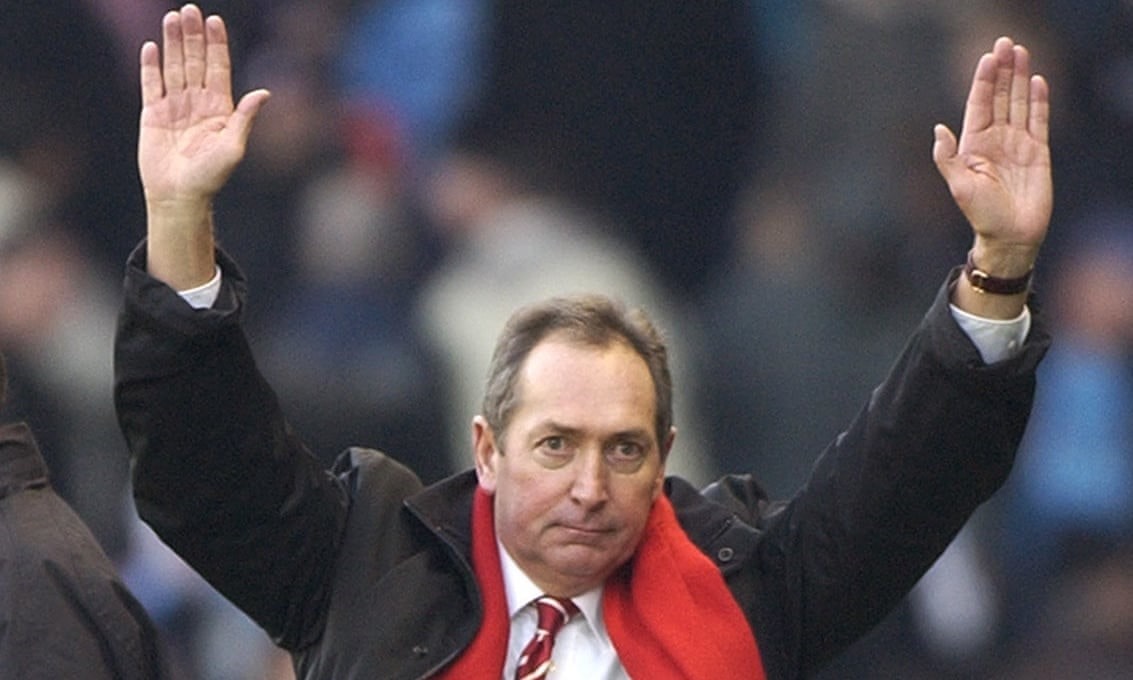
2004/05 – European Cup
The miracle of Istanbul will forever be remembered as one of the greatest football games of all time. With the Reds 3-0 down at half time in the Champions League final against a world class AC Milan side, all hope seemed lost for Rafa Benitez and his team.
The Reds started the second half strongly though, and through goals by Steven Gerrard, Smicer and Xabi Alonso, Liverpool began to rewrite history. Shevchenko took Milan’s last penalty in the shootout and Dudek saved the shot with his left hand – crowning Liverpool as champions of Europe again.
As the Liverpool Echo stated in their match report after the game, “it shouldn’t have happened. Some of us aren’t convinced it did. Only the pinch marks confirm it.”
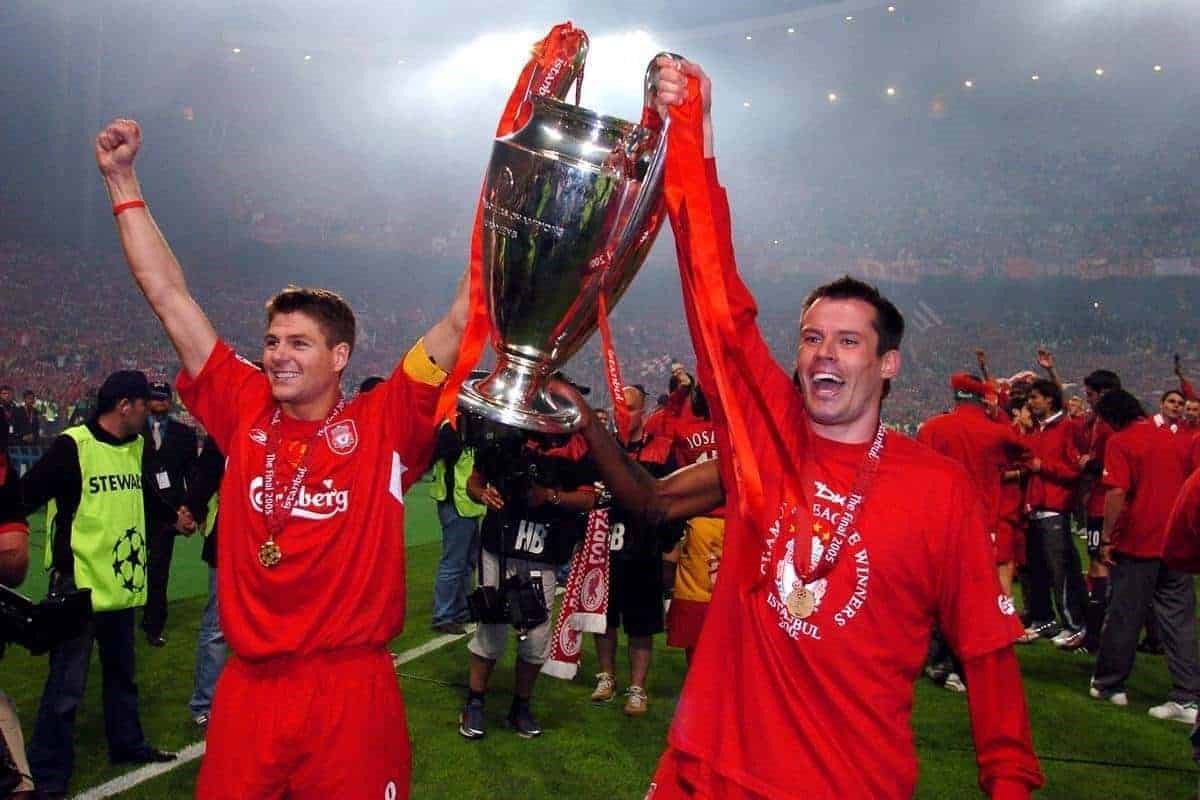
2005/06 – FA Cup, Super Cup, Community Shield
Hailed as the “Steven Gerrard final”, Liverpool faced West Ham at Wembley for the FA Cup final in 2006. Similarly to that Champions League final the year before, Liverpool looked all but beaten after going 2-0 down in the first half, only for the captain to step up and score two goals for the Reds to make the game level before his team won the trophy after a penalty shootout.
After 1991, extra time and penalties had been added to the community shield to ensure that there was a clear winner by the time that the game had ended. Nevertheless, Liverpool got the job done in the first 90 minutes when they played Chelsea for the trophy that year with a 2-1 win.
2011/12 – League Cup
Liverpool secured their eighth league cup against Cardiff City in 2012 – quite the achievement given that the club was on the brink of administration just 2 years earlier. With that in mind however, the Reds would not win another piece of silverware for another 7 years after their triumph in the league cup. Brendan Rodgers took the reigns at Liverpool on June 1, 2012 and came close to a league title with the club in 2014 before the title race turned on the Reds in dramatic fashion following Steven Gerrard’s slip against Chelsea.
2018/19 – European Cup
Liverpool have rebuilt themselves under the guidance of Jurgen Klopp following the Germans arrival in 2015, and it can be argued the re-emergence of Liverpool Football Club at the top of English and European football has mirrored what Bill Shankly achieved during his time with the club.
It has been a gradual process over the past five years with the Reds losing one Europa League final, one Champions League final and one Capital One Cup final along the way, but it all seemed worth it when Jordan Henderson lifted Liverpool’s sixth European Cup and their first in fourteen years after their win over Tottenham Hotspur in Madrid.
2019/20 – League Title, Club World Cup, Super Cup
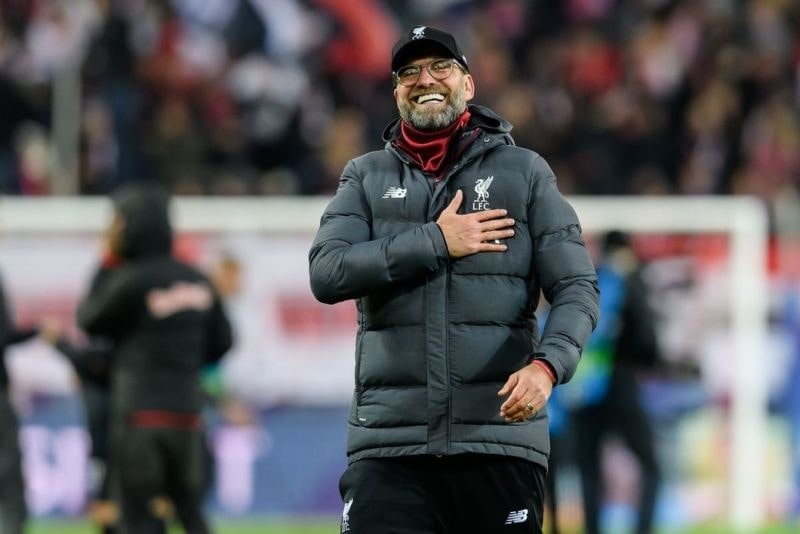
The campaign has seen Jurgen Klopp and his side end the 30-year drought of league titles at Anfield through Klopp’s intense, attacking style of football. On top of this, Liverpool won the Super Cup in August after a penalty shootout against Chelsea and secured the Club World Cup in December of 2019 – making them the most successful club in English football again with a total of 63 major honours.
With a squad full of world class individuals, Liverpool look set to achieve the level of success which supporters witnessed from the Reds throughout the 1970s and 80s.

